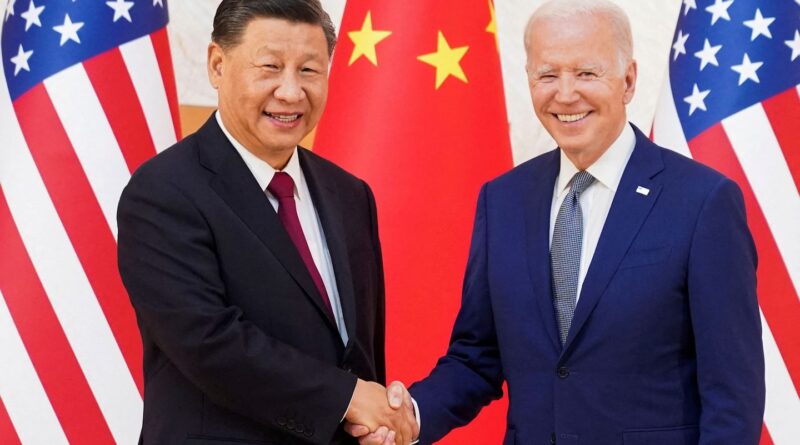Analysis | Xi and Biden meet amid a fracturing world order
But both Biden and Xi come to the summit somewhat in need of good news. The U.S. president is enmeshed in supporting two bloody, polarizing wars in Ukraine and Israel, and may see this week as an opportune moment to lower the temperature with Beijing and stabilize a relationship in free-fall. Xi, meanwhile, is arguably in worse shape, with China’s economy slumping, investor capital fleeing the country, and the deep damage wrought by Beijing’s draconian mishandling of the pandemic still being measured.
Biden may face a complicated election cycle ahead, but Xi, who has rearranged China’s one-party state around his indefinite (and possibly lifetime) rule, needs the summit to buttress his leadership credentials amid mounting scrutiny on his rule. To be sure, Xi is firmly ensconced in power, but growing internal pressures may lead the budding superpower down a more dangerous path, argued Minxin Pei, a political scientist focusing on China-U.S. ties at Claremont McKenna College.
“This is like a chronic disease. It’s not a heart attack,” Pei told my colleague Lily Kuo. “If things continue to go downhill, you will have a vicious cycle that is people start doubting his leadership more. His authority erodes even more, which means he will have even less influence over policy, and as a result he will become less secure.”
Expectations for the outcome of the Biden-Xi powwow are understandably low. Given how poor current ties are, the reopening of major communication channels and agreements for future talks could be hailed as a success. The two leaders may discuss the conduct of the wars in Gaza and Ukraine (over which they may disagree) and the collective problems posed by climate change and the rapid advance of AI technology (over which there’s more common ground). But advocates for a calmer U.S.-China relationship hope for deeper efforts to scale back tensions between the two nuclear-armed powers.
“To make genuine and lasting improvements in bilateral ties and steer the relationship away from militarized rivalry would,” observed Lyle Goldstein, director of Asia engagement for the Defense Priorities think tank, in an email, “require not a brief meeting on the sidelines of a multilateral summit, but instead the sustained, high-level attention of an annual U.S.-China summit lasting at least two full days.”
It’s unclear if Biden has the domestic political space to truly mend fences with Xi, or the appetite to do so. Hawkish Republicans are poised to exploit any perceived sign of acquiescence to the “new Cold War” adversary, while the U.S. public is increasingly wary of Beijing. According to recent polling by the Chicago Council on Global Affairs, a record number of Americans view China as a “critical threat,” while a plurality believe U.S. leadership isn’t doing enough to reckon with that threat.
Biden has spent his time in office steadily bolstering partnerships with countries in China’s neighborhood, raising Beijing’s alarm over the supposed “NATO-ization” of Asia even as China ramps up its saber rattling around Taiwan and the South China Sea. In its dramatic adoption of large-scale industrial policy at home involving technologies like advanced microchips, the Biden administration is laying the groundwork for a shift away from dependency on Chinese-dominated supply chains. The current movement of the tectonic plates of geopolitics points only to more friction.
New surveys of global attitudes regarding the United States and China show clear divides in opinion, but also a deeper fracturing. A Pew survey of 24 countries, ranging from Argentina to Sweden to South Africa, found that the United States was viewed far more positively than China, particularly among higher-income nations. The findings also pointed to Biden’s far greater popularity outside the United States compared to former president Donald Trump, who often received lower marks than Xi in certain countries during his tenure.
But the picture looks somewhat different outside the West. “Across eight middle-income countries … India stands out as the only middle-income country in which a majority has unfavorable views of China,” noted Pew in the report accompanying the survey, published last week. “And in three middle-income countries — Kenya, Mexico and Nigeria — a majority even gives China a positive rating.”
Another survey of 21 countries released Wednesday by the European Council on Foreign Relations found a similarly mixed bag. While the public in countries outside the West — ranging from Brazil to Turkey to India — may look more favorably at the standards of living and values of countries like the United States than those of China and Russia, they are less interested in yoking themselves to the West’s security and geopolitical projects.
The survey “reveals a complex geopolitical landscape in which people in great and middle powers around the world do not want to accept only one fixed set of partnerships,” notes ECFR’s accompanying report, laying out the contours of a new “a la carte world” where countries around the United States and China pursue a complex web of pragmatic interests.
Even the public in some European countries, argue the ECFR authors, like Serbia and Hungary under illiberal Prime Minister Viktor Orban, “conclude that in an à la carte world you can have a major economic relationship with China and security relations with the U.S., while also enjoying what Europe has to offer.”




